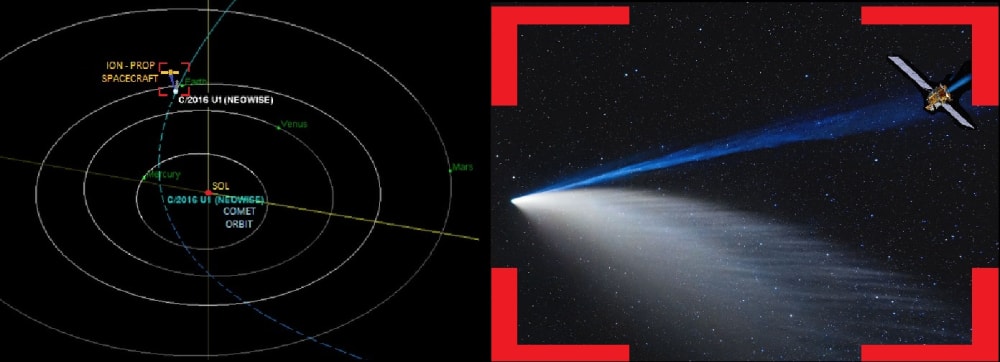The “Comet Towed Ion Propelled Spacecraft” is a concept design for a spacecraft utilizing a combination of modified solar power arrays (for onboard energy production) and ion propulsion thrusters (for thrust and speed), which will utilize the energy provided by the ion tail of a comet passing through the solar system.
The binary system of the comet and the spacecraft theoretically will provide a space exploration system with increased autonomy and range. The suggested onboard modified solar power arrays and ion propulsion thrusters can be used either as primary or secondary energy production and propulsion solutions, respectively.
The comet’s ion tail comprises mostly by ions (CO+, CO2+, N2+). As the comet enters the inner solar system, the Sun's radiation heats up the nucleus, warming up and ionizing its gases. These ions are electrically charged particles, and interact with the sun's solar wind. The interaction between the comet and the solar wind distorts magnetic field lines, causing the charged ions to stream along the magnetic field lines in the ion tail, and might be exploited as ionized propellant by the modified electrical propulsion system of the spacecraft. The comet’s ion tail always points away from the Sun.
Within the ion tail, CO+ absorbs sunlight and flouresces, emitting energy at a wavelength of 4200 Angstroms, which is the visible blue light and might be exploited by the modified solar power arrays of the spacecraft.
This concept spacecraft idea is considered highly complex, with multiple variables currently unknown or difficult to predict, on critical technical parameters (such us the calculation of the expected power and thrust output) and other astrophysical phenomena regarding the comet’s stable (or unstable) behavior, during the different phases of its course through the solar system.
Like this entry?
-
About the Entrant
- Name:Panagiotis Katsoudas
- Type of entry:individual
- Patent status:none

